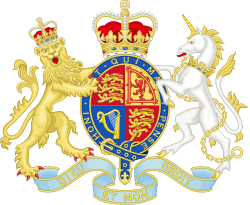Privy Council of the United Kingdom facts for kids

Royal Coat of Arms
|
|
| Abbreviation | Privy Council, PC |
|---|---|
| Predecessor |
|
| Formation | 1 May 1708 |
| Legal status | Non-executive advisory body |
|
Membership
|
List of current members |
| Queen Elizabeth II | |
| Jacob Rees-Mogg | |
|
Clerk of the Council
|
Richard Tilbrook |
|
Staff
|
Privy Council Office |
The Her Majesty's Most Honourable Privy Council is a special group of advisors to the British Monarch (the King or Queen). They help the monarch make important decisions.
Much of the Privy Council's work is done by two main groups:
- The Cabinet: This includes the most important government ministers. All Cabinet ministers become Privy Councillors. Other key politicians, like leaders of major political parties, also join.
- The Judicial Committee of the Privy Council: This group is made up of the most senior judges in England and Wales.
Some laws and decisions need to be approved by the "Queen-in-Council." This means the Queen makes the decision at a meeting with the Privy Council. For example, when a new Bishop or Lord Lieutenant is chosen, the Queen announces it at a Privy Council meeting.
Contents
Meetings of the Privy Council
Once someone becomes a member of the Privy Council, they are a member for life. However, usually only members of the current government are invited to regular meetings.
There are special occasions when all members might be invited. One such event is when a new monarch takes the "Accession Oath." This is a promise to do their best for the country. This happens at a meeting called the Accession Council.
In the past, some kings and queens found the long meetings boring. So, they made everyone stand up instead of sitting. This tradition continues today, even though meetings are shorter now.
Privy Council Terms
Sometimes, the Prime Minister shares secret information with other politicians. When this happens, they say the information is shared on Privy Council Terms. This means the information must be kept private and not shared with anyone else.
Judicial Committee of the Privy Council
The Judicial Committee of the Privy Council is a very important court. It is made up of senior judges, including former Law Lords. This committee acts as the final court of appeal for many places. These include British colonies, dependent territories, and some Commonwealth realms. When people appeal to this court, they are appealing to The Queen in Council.
Countries Using This Court
The Judicial Committee of the Privy Council serves as the highest court for several countries and territories.
Commonwealth Realms
These are independent countries where the British monarch is still the head of state:
- Antigua and Barbuda
- Bahamas
- Barbados
- Belize
- Cook Islands and Niue (which are associated with New Zealand)
- Grenada
- Jamaica
- St. Christopher and Nevis
- Saint Lucia
- Saint Vincent and the Grenadines
- Tuvalu
Overseas Dependent Territories
These are territories that are part of the United Kingdom:
- The Sovereign Base Areas of Akrotiri and Dhekelia (in Cyprus)
- Anguilla
- Bermuda
- British Virgin Islands
- Cayman Islands
- Falkland Islands
- Gibraltar
- Montserrat
- The Pitcairn Islands
- Saint Helena and its dependencies (Ascension Island and Tristan da Cunha)
- Turks and Caicos Islands
Commonwealth Republics
Four republics in the Commonwealth also use the Judicial Committee of the Privy Council as their final court of appeal:
- Republic of Trinidad and Tobago
- Commonwealth of Dominica
- Kiribati
- Mauritius
Brunei's Special Case
For appeals from the Court of Appeal of Brunei, the final decision rests with the Sultan of Brunei. However, The Queen and the Sultan have agreed that the Judicial Committee of the Privy Council hears these cases. The committee then advises the Sultan directly on their findings.
Cases Within the UK
The committee also hears certain appeals within the UK:
- From Jersey, Guernsey, and the Isle of Man.
- About "devolution issues," which are questions about the powers of the Scottish Parliament, the Northern Ireland Assembly, or the Welsh Assemblies. These cases can be sent to the committee by a Law Officer or come from other courts.
Very rarely, the committee hears other specific cases, such as:
- Appeals from the Church of England's Court of Arches and Chancery Court.
- Appeals from Prize Courts, which deal with the value of ships and their cargo.
- Disputes about whether someone is allowed to be a Member of Parliament under the House of Commons Disqualification Act.
The committee must also give advice to the Queen on anything she asks them to investigate.
Images for kids
-
Caricature by Thomas Rowlandson titled Privy Council of a King (1815)
-
Viviana Radcliffe examined by the Earl of Salisbury and the Privy Council in the Star Chamber. Illustration by George Cruikshank from William Harrison Ainsworth's novel Guy Fawkes.
-
Queen Victoria convened her first Privy Council on the day of her accession in 1837.
See also
 In Spanish: Consejo Privado del Reino Unido para niños
In Spanish: Consejo Privado del Reino Unido para niños
 | Selma Burke |
 | Pauline Powell Burns |
 | Frederick J. Brown |
 | Robert Blackburn |





